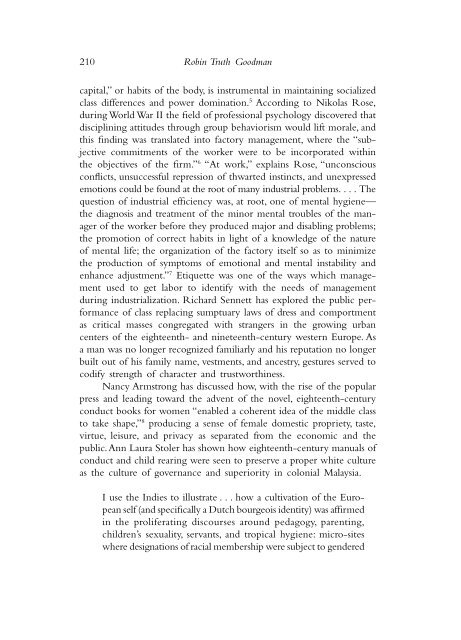Create successful ePaper yourself
Turn your PDF publications into a flip-book with our unique Google optimized e-Paper software.
210 Robin Truth Goodman<br />
capital,” or habits <strong>of</strong> <strong>the</strong> body, is instrumental in maintaining socialized<br />
class differences and power domination. 5 According to Nikolas Rose,<br />
during World War II <strong>the</strong> field <strong>of</strong> pr<strong>of</strong>essional psychology discovered that<br />
disciplining attitudes through group behaviorism would lift morale, and<br />
this finding was translated into factory management, where <strong>the</strong> “subjective<br />
commitments <strong>of</strong> <strong>the</strong> worker were to be incorporated within<br />
<strong>the</strong> objectives <strong>of</strong> <strong>the</strong> firm.” 6 “At work,” explains Rose, “unconscious<br />
conflicts, unsuccessful repression <strong>of</strong> thwarted instincts, and unexpressed<br />
emotions could be found at <strong>the</strong> root <strong>of</strong> many industrial problems. . . . The<br />
question <strong>of</strong> industrial efficiency was, at root, one <strong>of</strong> mental hygiene—<br />
<strong>the</strong> diagnosis and treatment <strong>of</strong> <strong>the</strong> minor mental troubles <strong>of</strong> <strong>the</strong> manager<br />
<strong>of</strong> <strong>the</strong> worker before <strong>the</strong>y produced major and disabling problems;<br />
<strong>the</strong> promotion <strong>of</strong> correct habits in light <strong>of</strong> a knowledge <strong>of</strong> <strong>the</strong> nature<br />
<strong>of</strong> mental life; <strong>the</strong> organization <strong>of</strong> <strong>the</strong> factory itself so as to minimize<br />
<strong>the</strong> production <strong>of</strong> symptoms <strong>of</strong> emotional and mental instability and<br />
enhance adjustment.” 7 Etiquette was one <strong>of</strong> <strong>the</strong> ways which management<br />
used to get labor to identify with <strong>the</strong> needs <strong>of</strong> management<br />
during industrialization. Richard Sennett has explored <strong>the</strong> public performance<br />
<strong>of</strong> class replacing sumptuary laws <strong>of</strong> dress and comportment<br />
as critical masses congregated with strangers in <strong>the</strong> growing urban<br />
centers <strong>of</strong> <strong>the</strong> eighteenth- and nineteenth-century western Europe. As<br />
a man was no longer recognized familiarly and his reputation no longer<br />
built out <strong>of</strong> his family name, vestments, and ancestry, gestures served to<br />
codify strength <strong>of</strong> character and trustworthiness.<br />
Nancy Armstrong has discussed how, with <strong>the</strong> rise <strong>of</strong> <strong>the</strong> popular<br />
press and leading toward <strong>the</strong> advent <strong>of</strong> <strong>the</strong> novel, eighteenth-century<br />
conduct books for women “enabled a coherent idea <strong>of</strong> <strong>the</strong> middle class<br />
to take shape,” 8 producing a sense <strong>of</strong> female domestic propriety, taste,<br />
virtue, leisure, and privacy as separated from <strong>the</strong> economic and <strong>the</strong><br />
public. Ann Laura Stoler has shown how eighteenth-century manuals <strong>of</strong><br />
conduct and child rearing were seen to preserve a proper white culture<br />
as <strong>the</strong> culture <strong>of</strong> governance and superiority in colonial Malaysia.<br />
I use <strong>the</strong> Indies to illustrate . . . how a cultivation <strong>of</strong> <strong>the</strong> European<br />
self (and specifically a Dutch bourgeois identity) was affirmed<br />
in <strong>the</strong> proliferating discourses around pedagogy, parenting,<br />
children’s sexuality, servants, and tropical hygiene: micro-sites<br />
where designations <strong>of</strong> racial membership were subject to gendered
















